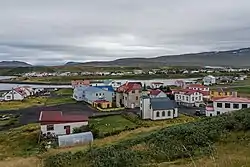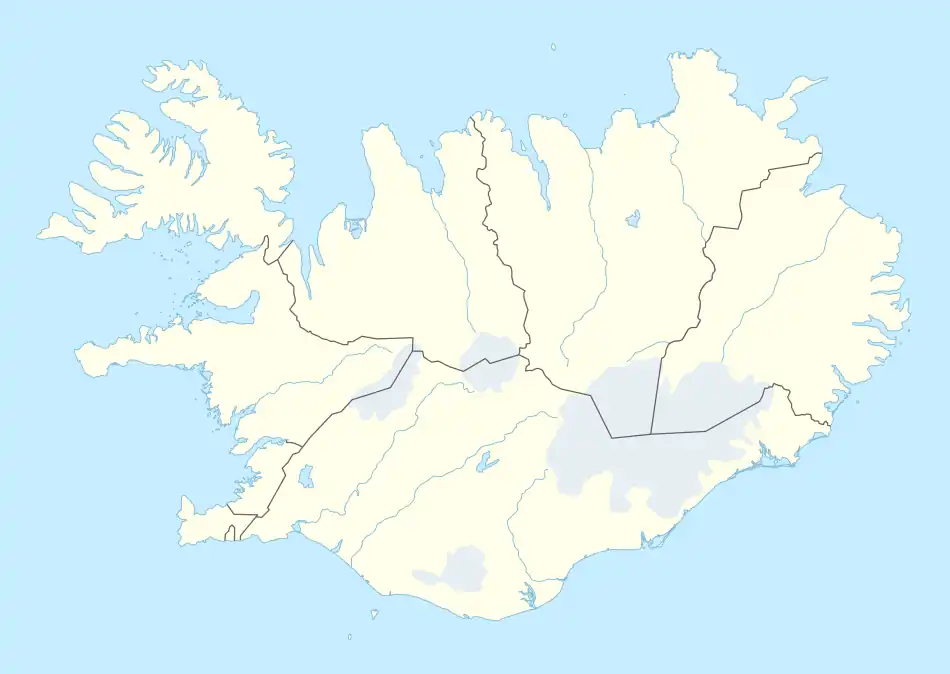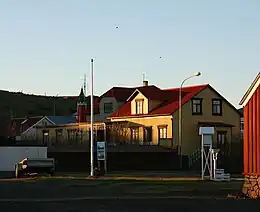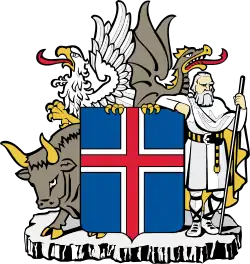Blönduós
Blönduós (Icelandic pronunciation: [ˈplœntʏˌouːs] ⓘ) is a town and former municipality in the north of Iceland with a population of 895 in 2018.[1] Like many towns and villages around Iceland, Blönduós did not emerge as a village until the late 19th century. The town is situated on Route 1 at the mouth of the glacial river Blanda. Hrútey [ˈr̥uːtˌeiː], a small island and natural reserve encircled by the river, is accessible via a pedestrian bridge just off the ring road. In 2022, the town merged with Húnavatnshreppur to form Húnabyggð.[2]
Blönduósbær | |
|---|---|
Town and former municipality | |
 Houses in Blönduós | |
 Blönduósbær | |
| Coordinates: 65°40′N 20°18′W | |
| Country | Iceland |
| Region | Northwestern Region |
| Constituency | Northwest Constituency |
| Municipality | Húnabyggð |
| Established | 1876 |
| Area | |
| • Total | 183 km2 (71 sq mi) |
| Population | |
| • Total | 895 |
| • Density | 4.73/km2 (12.3/sq mi) |
| Postal code(s) | 540, 541 |
| Website | blonduos |
Geography

One of Blönduós' main characteristics is that the town is split into two parts by the glacial river Blanda, for which it is named (Blöndu is an oblique case of Blanda). The old part of town (Icelandic: "gamli bærinn"), including many original houses from the late 19th and early 20th century, is located on the south side of the river. Many of the local companies, the elementary school, supermarket, community center and sports facilities including a modern outdoor heated pool are located on the north side. On a hill above town is a church with striking architecture that is intended to resemble a volcanic crater.
Economy
Most of the industry and livelihood in Blönduós evolve around service for agriculture and tourism.[3] In recent years, the town has become known for its connection with textiles. A wool washery, Iceland's only textile museum Heimilisiðnaðarsafnið and the Icelandic Textile Center, featuring a residency program for international textile artists and scholars, are all located in Blönduós.
Notable people
- María Ólafsdóttir (born 1993), singer, musician and actress
Twin towns – sister cities
Climate
Blönduós has a tundra climate (ET).
| Climate data for Blönduós (1971–2000) | |||||||||||||
|---|---|---|---|---|---|---|---|---|---|---|---|---|---|
| Month | Jan | Feb | Mar | Apr | May | Jun | Jul | Aug | Sep | Oct | Nov | Dec | Year |
| Record high °C (°F) | 11.4 (52.5) |
12.1 (53.8) |
13.7 (56.7) |
17.2 (63.0) |
19.8 (67.6) |
23.0 (73.4) |
23.2 (73.8) |
20.5 (68.9) |
20.3 (68.5) |
18.5 (65.3) |
15.1 (59.2) |
12.6 (54.7) |
23.2 (73.8) |
| Average high °C (°F) | 0.6 (33.1) |
1.1 (34.0) |
1.7 (35.1) |
4.3 (39.7) |
8.1 (46.6) |
11.2 (52.2) |
13.0 (55.4) |
12.7 (54.9) |
9.5 (49.1) |
5.5 (41.9) |
2.3 (36.1) |
0.9 (33.6) |
5.9 (42.6) |
| Daily mean °C (°F) | −2.3 (27.9) |
−2.1 (28.2) |
−1.4 (29.5) |
1.0 (33.8) |
4.8 (40.6) |
7.7 (45.9) |
9.5 (49.1) |
9.3 (48.7) |
6.0 (42.8) |
2.6 (36.7) |
−0.4 (31.3) |
−2.0 (28.4) |
2.7 (36.9) |
| Average low °C (°F) | −5.8 (21.6) |
−5.0 (23.0) |
−4.3 (24.3) |
−2.0 (28.4) |
1.8 (35.2) |
4.8 (40.6) |
7.0 (44.6) |
6.5 (43.7) |
3.4 (38.1) |
0.1 (32.2) |
−3.3 (26.1) |
−5.4 (22.3) |
−0.2 (31.7) |
| Record low °C (°F) | −20.9 (−5.6) |
−21.8 (−7.2) |
−24.3 (−11.7) |
−19.6 (−3.3) |
−10.5 (13.1) |
−3.6 (25.5) |
−0.6 (30.9) |
−4.4 (24.1) |
−7.2 (19.0) |
−12.1 (10.2) |
−17.0 (1.4) |
−21.0 (−5.8) |
−24.3 (−11.7) |
| Average precipitation mm (inches) | 40.6 (1.60) |
34.2 (1.35) |
42.5 (1.67) |
31.1 (1.22) |
30.1 (1.19) |
37.1 (1.46) |
44.3 (1.74) |
44.5 (1.75) |
43.2 (1.70) |
51.6 (2.03) |
37.6 (1.48) |
38.5 (1.52) |
475.3 (18.71) |
| Source: Icelandic Met Office (extremes 1952–2003, excluding 1963–67 due to lack of data)[6][7] All statistics between 1968 and autumn of 1981 are for Hjaltabakki, 2.9 km (1.8 mi) from Blönduós) | |||||||||||||
References
- "Statistics Iceland
- Árni Sæberg. "Samþykktu að sameinað sveitarfélag fái nafnið Húnabyggð - Vísir". visir.is (in Icelandic).
- ""Hit Iceland information page about Iceland"". Archived from the original on 2017-09-24. Retrieved 2016-11-24.
- "Ystävyyskaupunkitoiminta". nokiankaupunki.fi (in Finnish). Nokia. Retrieved 2020-02-12.
- "Puljer, tilskud og fonde". horsens.dk (in Danish). Horsens Kommune. Retrieved 2020-02-12.
- "Monthly Temperature and Precipitation Averages for Blönduós". Icelandic Meteorological Office. Retrieved 19 March 2017.
- "Monthly Temperature and Precipitation Averages for Hjaltabakki". Icelandic Meteorological Office. Retrieved 19 March 2017.
External links
- Statistics Iceland
- More information and photos about Blönduós town on Hit Iceland Archived 2017-09-24 at the Wayback Machine
- Official website
- "Textile Museum Homepage"
- "Textile Center Homepage"
